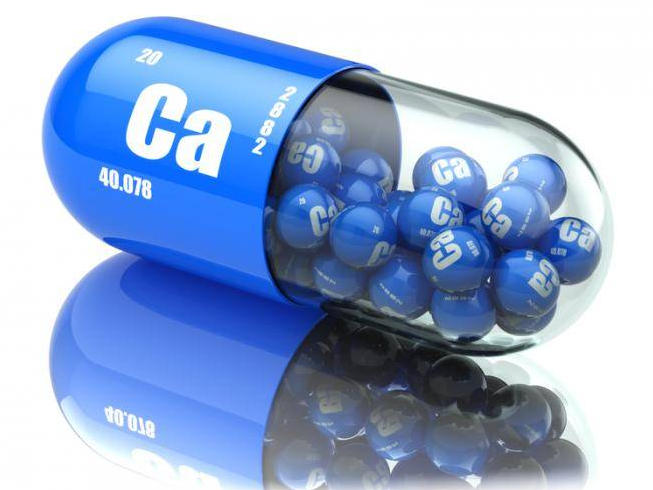Taking calcium carbonate tablets as an antacid can help eliminate indigestion.
Reduce high potassium levels in the blood
In a 2012 study published in Internal Medicine Perspectives, a local hospital found calcium gluconate to be effective in controlling high potassium levels and preventing cardiomyocyte damage.

Control low blood calcium levels
According to a review of several studies published in The BMJ in 2008, hypocalcemia can be controlled in many ways, depending on the cause and degree of the decrease. For instance, persistently low calcium levels may be caused by inadequate vitamin D levels. Vitamin D and calcium supplements can treat its deficiency, whereas patients with wheat allergy disease, which causes malabsorption of some minerals, should take calcium and vitamin D supplements by avoiding gluten.
Reducing dialysis patients’ phosphate levels
According to a 2004 study published in Kidney International, calcium acetate helps control phosphorus levels in dialysis patients with hyperphosphatemia without increasing calcium levels. There are many health problems associated with it that may increase the risk of death.
However, those with high blood phosphate levels or low blood levels should consult their doctor before consuming large amounts of calcium. The balance between calcium and phosphate levels can be affected, resulting in damage.
Rheumatoid arthritis and bone health
Calcium and vitamin D supplements were found to reduce bone loss in patients with lumbar and trochanteric spine B rheumatoid arthritis taking low doses of corticosteroids, according to a study published in Annals of Internal Medicine.
Hyperparathyroidism prevention
According to a study published in the American Journal of Kidney Diseases, calcium carbonate reduces parathyroid hormone levels, which reduces hyperparathyroidism.
In contrast, calcium intake by hypothyroidism patients may interfere with the medications they are taking to treat this deficiency.
Osteoporosis risk can be reduced
Taking calcium supplements can help reduce the risk of osteoporosis in the long term, and some researchers have shown that it can improve bone strength by 10% after menopause.
Premenstrual syndrome relief
In a 2017 study published in Obstetrics and Gynecology, calcium supplements were found to help reduce PMS symptoms, including mood disorders. Premenstrual syndrome is associated with anxiety, depression, and physical changes, such as fluid retention.
Colon cancer prevention
In 2002, a study published in the Journal of the National Cancer Institute showed that high calcium intake reduced colon cancer risk in both men and women, but more research is needed.
Preventing fetal bone loss during pregnancy
According to a study published in the Indian Journal of Endocrinology and Metabolism in 2012, pregnant women need more calcium. Calcium absorption increases along with bone resorption, where calcium is transported from its stores. To maintain the health of women and fetuses’ bones during pregnancy and after, and to reduce osteoporosis risk in the long run, calcium needs to be consumed in the right amount during this period, along with vitamin D.

Fluorosis prevention
A preliminary study published in the Journal of Medical Sciences in 2017 found that calcium supplements can reduce the risk of dental fluorosis among children who suffer from this poisoning early on.
Lower cholesterol levels
Researchers found that calcium carbonate lowers bad cholesterol levels and increases good cholesterol levels in low to moderate high cholesterol levels, according to a study published in the Archives of Internal Medicine. However, it had no effect on lowering triglycerides.
Blood pressure can be reduced
According to a study published in the American Journal of Clinical Nutrition, calcium supplementation can reduce diastolic blood pressure in adolescents who don’t consume enough calcium sources.
Preeclampsia risk reduction
A 2014 review in the Cochrane Database of Systematic Reviews found that calcium supplements reduce the risk of preeclampsia. Especially in women who consume small amounts of calcium sources.
Rickets prevention
A 2016 study published in the Journal of Bone and Mineral Research found that some children with rickets can take calcium supplements for 24 weeks. To reach this amount, it takes more than 24 weeks. Nevertheless, increasing the dosage to more than 1000 mg is not associated with rapid relief of this condition.
Preventing tooth loss in the elderly
According to a study published in the American Journal of Medicine in 2001, some seniors taking calcium and vitamin D supplements had a lower risk of tooth loss over a 3-year period. He did not take these supplements in comparison to the group that consumed them.
Children’s calcium benefits
In particular, calcium consumption during adolescence helps reduce the risk of osteoporosis and osteoporosis. During adolescence, most of the body’s bones grow.
Teenagers, especially girls, who do not consume adequate amounts of important nutrients for bone formation, and children and infants who do not consume adequate amounts of calcium and vitamin D, are more likely to develop bone diseases. Softening caused by rickets.
Pregnant women benefit from calcium
Calcium is essential for maintaining the health of the bones of the fetus during pregnancy; therefore, it is important to consume calcium with vitamin D in sufficient amounts during this period in order to maintain the health of the bones of both the woman and fetus.
Hair benefits of calcium tablets
The use of calcium tablets helps strengthen hair growth and prevent hair loss as well as reducing splitting and dryness of hair.
Calcium intake recommendations
Calcium intake by gender, age group, and some items is shown in the following table:
| age category | Recommended daily amount (mg) |
| Babies 0-6 months old | 200 |
| Babies 7-12 months old | 260 |
| Children 1-3 years old | 700 |
| Children 4-8 years old | 1000 |
| Children 9-13 years old | 1300 |
| 14-18 year olds | 1300 |
| Pregnant and lactating women 14-18 years old | 1300 |
| People aged 19-50 | 1000 |
| Pregnant and lactating women 19 to 50 years old | 1000 |
| Men aged 51-70 | 1000 |
| Women aged 51-70 | 1200 |
| People 71 years or older | 1200 |
Those with low stomach acid levels, or those who have lost stomach acid. Due to calcium absorption being lower with an empty stomach, calcium tablets are recommended to be taken with food to maximize absorption.
Those with high blood phosphate levels or low blood levels; Since there is a balance between calcium and phosphate in the body, consuming too much calcium may cause harm, so a doctor should be consulted before consuming this amount of calcium.
Calcium may interact with medications used to treat hypothyroidism, so it is best to take it four hours after taking these medications.
Calcium supplements may cause excessive calcium levels in those with kidney function.
In smokers, calcium absorption is reduced.
Older women who have already suffered a stroke may have an increased risk of developing dementia if they take calcium supplements for 5 years or more, according to preliminary studies. However, further studies are needed to determine whether calcium supplements should be avoided. Avoid taking supplements.
People who take certain medications to treat constipation. Taking calcium supplements with other constipation medications may make constipation worse. Calcium supplements have little effect on constipation.
For pregnant women, calcium tablets are generally considered safe if taken orally and in the correct dosage, and in case of excessive consumption, the pregnant woman will experience the same symptoms as before. Constipation, low parathyroid hormone levels, etc.
Neurological disorders and their symptoms
In addition to prostate cancer, there is an increased risk of kidney disease, heart disease, and other diseases.
Calcium drug interactions
Calcium can interact with the following drugs in the body, so it is recommended to consult a doctor before taking them together:
There should be a 48-hour gap between taking intravenous calcium and this medicine if you are taking ceftriaxone.
This medication is used to treat human immunodeficiency virus (HIV), and calcium can reduce its level in the blood, which may reduce its effect on the body, and for this reason it is recommended to take this drug twice a day.
It is recommended that you take this drug two hours before or two hours after consuming calcium because taking calcium together with this drug reduces its level in the blood, which may reduce its effect in the body.
Calcium citrate supplements can increase the body’s ability to absorb aluminum when taken with aluminum hydroxide, which can be toxic to kidney patients. However, not all calcium supplements cause this effect.
A group of antibiotics called quinolones, which include ciprofloxacin, levofloxacin, and ofloxacin. Calcium can reduce the body’s ability to absorb quinolones, which may reduce their effectiveness, so quinolone two should be used instead.
The absorption and effect of bisphosphonates in the body can be reduced if calcium is taken 30 minutes before bisphosphonates.
It is similar to vitamin D, which helps the body absorb calcium, so taking calcipotriol with calcium can cause a significant increase in calcium levels.
A digoxin is a drug that increases the strength of the heartbeat, and calcium can affect the heart, and its use with this drug may cause irregular heartbeats, so it is recommended to consult a doctor before taking both at the same time.
Calcium can reduce the effects of Diltiazem when taken in large amounts.
This drug is used when the thyroid gland’s function decreases, but calcium can reduce its absorption and effect in the body, so it is recommended to leave at least four hours between doses.
If taken with calcium supplements, lithium can increase blood calcium levels after long-term use.
Long-term use of calcium with this drug can reduce the level of raltegravir in the blood, reducing its effectiveness.
Taking calcium with sotalol reduces the drug’s absorption in the body, which may reduce its effect, so it is recommended to take calcium two hours before or four hours after taking sotalol.
Calcium and verapamil can affect the heart, so they should not be taken together.
The estrogen in them aids in the absorption of calcium in the body, so eating them with a large amount of calcium can increase its levels.
These blockers are used for high blood pressure; calcium can reduce their effect in the body if taken intravenously, but not to the extent when taken as supplements or in food.
Calcium tablets types
Calcium supplements come in a variety of types, and the doctor determines the right one for each patient based on their needs, health conditions, and medications. Calcium and its compounds can be found in different levels in supplements. Here are some examples:
Calcium carbonate: it is the most readily available, its price is reasonable, and it contains 40% of calcium. It is recommended to consume it with food. The stomach acid helps the body absorb nutrients
It contains 21% elemental calcium, suitable for people with decreased stomach acid, inflammatory bowel disease, and malabsorption problems.
